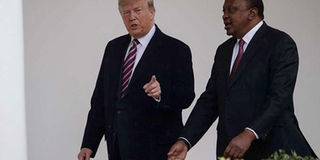Let’s grab chance of newfound markets

US President Donald Trump (left) walks with Kenyan President Uhuru Kenyatta at the White House in Washington, DC, on February 6, 2020. The Trump administration announced that it will seek a free-trade agreement with Kenya. PHOTO | NICHOLAS KAMM | AFP
What you need to know:
- Taking part in the AfCFTA agreement was a good way to strengthen Africa and show solidarity with the rest of the continent.
- If Kenya is to be seen as a world leader in international forums, it is time to increase direct agreements with the most populous high-income nations.
One can say without a doubt that President Uhuru Kenyatta’s recent meeting with his United States counterpart Donald Trump in Washington was fruitful.
Following the meeting, the Trump administration announced that it will seek a free-trade agreement (FTA) with Kenya. This would be the first time that a sub-Saharan African nation has signed an FTA with America.
The same can be said of the recent UK-Africa Investment Summit in London.
Currently, the US African Growth and Opportunity Act (Agoa) eliminates trade barriers on certain African exports to America. Kenya benefits from the law but, unfortunately, it is set to expire in five years.
Therefore, making sure that Kenya’s trade interests are promoted abroad should be of top priority for President Kenyatta during the remainder of his final term.
In 2018, trade between Kenya and the US was valued at more than $1 billion (Ksh100 billion). In the same year, it was $14 billion between South Africa and the US. The only other African country that has an FTA with the US is Morocco.
ECONOMIC TIES
Besides being the world’s biggest economy, the US is one of the largest consumers of agricultural goods, textiles and other products from around the world.
There is no reason, therefore, why Kenya should not look west, to America, to increase its export market, especially in light of the fact that US FTAs with Canada and Mexico have recently changed.
American politicians have already praised the move. US Trade Representative Robert Lighthizer said: “Kenya is a recognised leader across the continent, an important strategic partner of the United States, and there is enormous potential for us to deepen our economic and commercial ties.
“We believe a trade agreement between the United States and Kenya will receive broad bipartisan support in Congress.”
Similarly, following his meeting with President Kenyatta, Representative Richard Neal of Massachusetts, who chairs the House committee on Overseas Trade, said that expanding trade agreements with Kenya reflects the two countries’ common democratic values.
He observed that the move will “demonstrate a commitment to the enforcement of strong worker rights, environmental protections, and good governance”.
AFRICA'S GROWTH
Nearer to home, the African Continental Free Trade Area (AfCFTA) has already been signed to enable Kenya to trade seamlessly with many of our neighbours.
Taking part in this agreement was a good way to strengthen Africa and show solidarity with the rest of the continent.
The success of our economy is, to some extent, contingent on the stability and prosperity of all of Africa.
An FTA between Kenya and the US would not undermine our involvement in the AfCFTA, President Kenyatta was quick to assuage the doubters.
Rather, it would position us as one of Africa’s leading economies. It allows us to grow and nurture the common values highlighted by Mr Neal — democracy, conservation, good governance and opportunity.
Of late, Kenya has become a free and fair society with healthy economic prospects. However, this open market is yet to reach its full potential.
Until now, we have not yet positioned ourselves as an economic powerhouse. Perhaps within Africa, yes, but we are edging closer to that role on a global scale.
WIDEN NET
If Kenya is to be seen as a world leader in international forums — the UN Security Council, military alliances and the entrepreneurial community — it is time to increase direct agreements with the most populous high-income nations.
President Kenyatta seems to have adopted this policy repeatedly in the past several years. Under him, Kenya has seen increasingly mutually beneficial relations with the US, UK and China.
The country has big plans for development — including the ‘Big Four Agenda’ and Vision 2030. Why limit ourselves to local partnerships when bigger opportunities are available internationally?
Furthermore, proving ourselves as a reliable trading partner can transform our image as a stable rock amid Africa’s not infrequent economic and political turmoil.
It is time we distinguished ourselves not only as East Africa’s leader but that of the entire continent. We have been slowly getting there.
This FTA could be the first of Kenya’s many more exchanges with the US, and I look forward to watching this special alliance flourish. Carpe diem!
Mr Mugwang’a is a communications consultant. [email protected].




